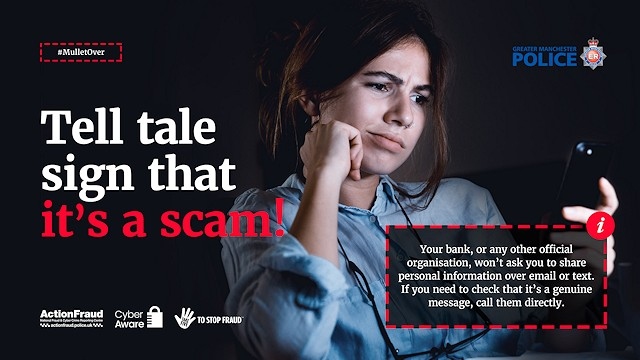Be aware of fraudsters this National Phishing Week
Date published: 05 September 2020

Fraudsters send scam emails to trick victims into disclosing personal and sensitive information
The impact of fraud can be both financially and emotionally devastating so be aware of fraudsters this National Phishing Week.
Phishing is a cybercrime, which tricks the recipient into providing sensitive data – such as passwords – to someone pretending to be a legitimate individual or company.
Scam emails are sent from fraudsters to trick victims into disclosing personal and sensitive information. The emails often claim to be sent from trusted sources such as banks or HMRC, PayPal or even TV Licensing.
They will ask you to click on a link and then enter personal information which can be used to defrauded you or steal your identity.
How to protect yourself
- Check the address the email has been sent from. By using your mouse to hover over or right-click on the sender name, you will be able to see the email address behind it. Fraudsters often have bizarre email addresses or one that doesn't quite match with the company they are claiming to be.
- Look to see who the email addressed to. Often fraudsters will use an impersonal greeting such as 'Hi' or 'dear customer'.
- Don't feel pressured. Scam emails will often claim there is a time limit or sense of urgency for you to act now, but don't feel pressured. Take your time to make the checks you need.
- Watch out for out for spelling and grammar mistakes. Also look out for slight changes in things such as a website link. This could look very similar to the company's real website, but even a single character difference means it is leading you to different website.
- Think about whether you are expecting an email from that company. If it's out of the blue, it could be a scam.
Detective Constable Claire Leonard, from GMP’s Cyber Crime Team, said: “A common type of scam email is phishing attacks, which are a security challenge that both individuals and businesses across the UK face on a regular basis.
"Phishing emails are when fraudsters send bogus communications: emails, letters, instant messages or text messages, aiming to lure people into giving away their personal or financial information. The messages often appear to come from legitimate companies.
"This week there is a national #MulletOver campaign, giving tips on how to spot phishing emails and advising the public on how to protect themselves."
Do you have a story for us?
Let us know by emailing news@rochdaleonline.co.uk
All contact will be treated in confidence.
Most Viewed News Stories
- 1Failing care home shut by health watchdog following safety concerns
- 2Woman of Rochdale 2024 – Lorenza Pye
- 3Visually impaired campaigners say controversial cycle scheme is unsafe for them
- 4Man charged in connection with assault on Christmas Eve in Sudden
- 5Long-awaited hydrotherapy pool opens for public use in Castleton
To contact the Rochdale Online news desk, email news@rochdaleonline.co.uk or visit our news submission page.
To get the latest news on your desktop or mobile, follow Rochdale Online on Twitter and Facebook.


